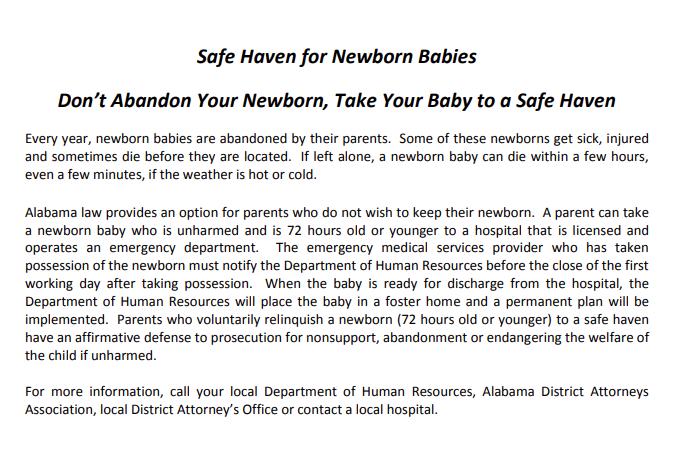
Alabama’s “Safe Haven” laws offer a lifeline for desperate parents, allowing them to relinquish their newborns safely. While these provisions are meant to protect the most vulnerable, they also reveal deeper issues in how society handles crisis situations involving new parents and infants.
On the surface, the laws seem straightforward. Parents can take a newborn, no older than 72 hours, to a licensed hospital with an emergency department. Once there, they are protected from prosecution for nonsupport, abandonment, or endangering the welfare of the child—provided the infant is unharmed. This legal shield is designed to prevent parents from abandoning their babies in dangerous or life-threatening situations, offering a seemingly humane alternative.
But here’s where the problem lies. The very existence of Safe Haven laws points to a failure in addressing the root causes of why a parent might feel compelled to give up their child. While it’s true that these laws can prevent tragedy, they are a band-aid solution that doesn’t address the underlying issues—lack of support for struggling parents, insufficient access to family planning resources, and the societal stigmas that still surround unplanned pregnancies.
Mothers can dump their newborn babies in a box and abandon them anonymously in Alabama. pic.twitter.com/fJqEQJOztp
— Wild content (@NoCapFights) August 24, 2024
The incentive structure of these laws also raises concerns. While it’s commendable that parents are given the option to relinquish a newborn without facing legal consequences, the focus seems to be more on avoiding criminal charges rather than providing genuine support and options for parents in crisis. Instead of creating an environment where parents feel empowered to care for their children, Alabama’s approach seems to encourage relinquishment as a quick fix.
Safe Haven laws may prevent the immediate harm that could come from abandoning an infant, but they do little to prevent the conditions that lead parents to make such a heartbreaking choice in the first place. In a state where access to comprehensive healthcare, social services, and family support systems is often lacking, these laws are a stopgap measure, not a solution.
Ultimately, while Alabama’s Safe Haven laws are necessary in a world where desperate situations do arise, they should not be seen as the end-all solution. Rather, they should prompt us to question why we aren’t doing more to support parents before they reach the point of no return. It’s time to move beyond temporary fixes and address the deeper issues that push parents to the edge.
Sources:
https://dhr.alabama.gov/wp-content/uploads/2019/07/Safe-Haven-for-Newborn-Babies.pdf
https://dhr.alabama.gov/wp-content/uploads/2023/12/Safe-Haven-for-Newborn-Babies-12-4-23-update.pdf
https://safehavenlaws.uslegal.com/alabama-safe-haven-laws-relating-to-abandoned-newborns/
https://law.justia.com/codes/alabama/2020/title-13a/chapter-13/section-13a-13-5/